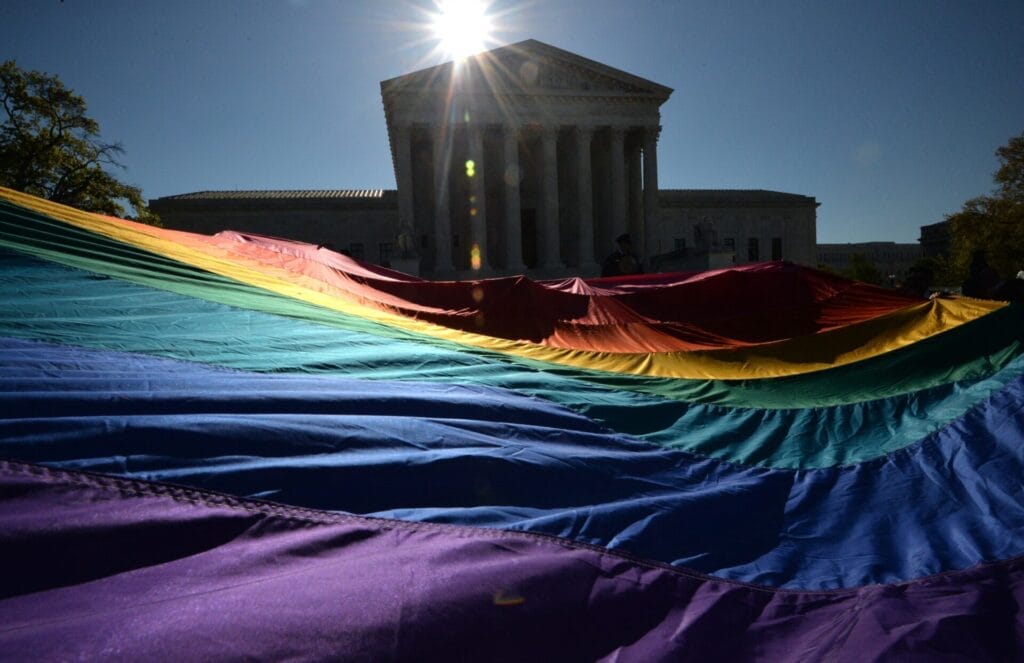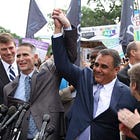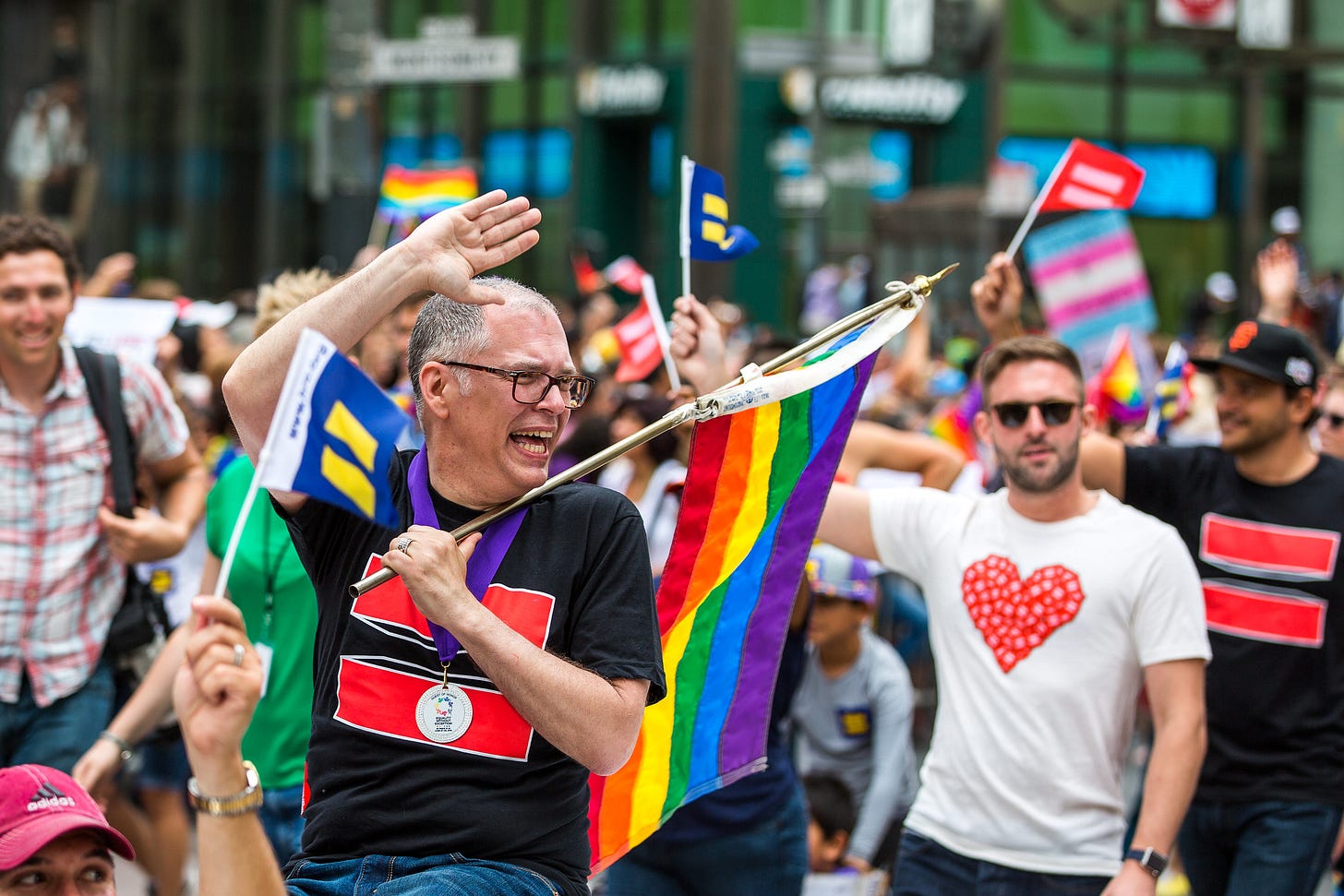'Oh, that glorious day!' Where Were You 10 Years Ago When History Was Made?
Memories of June 26, 2015, as well as other pivotal moments that changed our lives, paving the way for marriage equality.

Marriage and love aren’t the same thing. You don’t have to be married to be in love—and vice versa. Plus, love can be expressed in a multitude of ways beyond typical notions of romantic love, including having a legal contract to validate it. This isn’t a piece advocating for people to get hitched anytime soon (unless that’s your own personal dream).
For years, I avoided the idea of taking the step to get married (for a variety of reasons that I’ve written about), while believing in the fight for marriage equality and that same-gender couples should have the right to marry. And the right NOT TO MARRY.
That said, it’s important to take a moment to note this important anniversary:
June 26, 2025 marks 10 years since the Supreme Court issued a ruling that guaranteed the right to legal marriage for same-sex couples across the United States in all 50 states. It’s the most important Supreme Court case of my lifetime—since it radically changed the idea of marriage in the United States—and it may be threatened and overturned if we don’t remain vigilant.
As Justice Anthony Kennedy, joined by the court’s four more liberal justices, wrote in the majority 5-4 opinion in 2015:
“The ancient origins of marriage confirm its centrality, but it has not stood in isolation from developments in law and society. The history of marriage is one of both continuity and change. That institution — even as confined to opposite-sex relations — has evolved over time. …”
“Until the mid-20th century, same-sex intimacy long had been condemned as immoral by the state itself in most Western nations, a belief often embodied in the criminal law. For this reason, among others, many persons did not deem homosexuals to have dignity in their own distinct identity. A truthful declaration by same-sex couples of what was in their hearts had to remain unspoken. …”
“No union is more profound than marriage, for it embodies the highest ideals of love, fidelity, devotion, sacrifice, and family. In forming a marital union, two people become something greater than once they were. As some of the petitioners in these cases demonstrate, marriage embodies a love that may endure even past death. It would misunderstand these men and women to say they disrespect the idea of marriage. Their plea is that they do respect it, respect it so deeply that they seek to find its fulfillment for themselves. Their hope is not to be condemned to live in loneliness, excluded from one of civilization’s oldest institutions. They ask for equal dignity in the eyes of the law. The Constitution grants them that right.”
Despite remaining divisive for many, same-sex marriage remains popular across generations, with most recent polls showing that over two-thirds (approximately 68%) agree that same-sex couples should be treated as equal citizens and granted the rights and privileges the majority of couples in the country already get for just being straight. Some reports also show, however, that the schism between Democrats and Republicans has widened in recent years. It’s one reason the bipartisan Respect for Marriage Act felt essential to pass in 2022—despite some saying it was an unnecessary law—to offer further protections in case the Supreme Court “changes its mind.”
As Justice Kennedy also said, the stories of the people asking for the right to marry “reveal that they seek not to denigrate marriage but rather to live their lives, or honor their spouses’ memory, joined by its bond.” It’s yet another reason why it’s important to share and amplify our narratives, like we do at The Queer Love Project.
Our stories matter.
Earlier this week, we asked people to share their memories of where they were on that historic day 10 years ago, as well as how it felt. We received a trove of joyful anecdotes—as well as many that explored other pivotal recent landmark cases that hit home in profound ways. Here’s a collection of some of those submitted in the comments and via social media. Feel free to comment on this post and add yours as well!
Oh, that glorious day!
“My wife and I were on vacation in Oregon, staying at a hotel at the beach. I’ll never forget how I felt as I watched the breaking news on the television in our hotel room. The sun was just setting, and the sounds of the waves cresting, combined with this amazing news, brought a joy to my heart that I’ve only ever felt a handful of times in my life. We now know that even what seems settled case law can unravel under the heat and pressure of the extreme rightwing forces now in play. But oh, that glorious day!” —Julie Snider
Edie’s case paved the way
“For my husband, who is not a U.S. citizen, and me, the 2013 ruling in United States v. Windsor—which invalidated Section 3 of the Defense of Marriage Act—had a bigger impact. At the time, we were living in Canada. Long story short, he followed me from Japan to the U.S. in 1998 on a student visa. When those requirements (and costs) became too onerous in 2006, I got a student visa in British Columbia and we both moved north (Canadian immigration treated my partner as a common-law spouse because we shared an address and bank accounts).
“When U.S. v. Windsor was read out on NPR that morning in 2013, I got up from my desk, walked down the hall, and told my husband: "We're getting married." On July 7, 2013, in front of a small group of friends who agreed to serve as witnesses, we were wed. On September 1, 2013, after a grueling summer of collecting all the needed paperwork, we filed for his green card.
“When Obergefell was read out on June 26, 2015, my husband had just received his green card and we were preparing our move back to the Seattle area, but we heard the cheers of joy from our queer siblings from across the border.” —Brian Watson
A flood of relief
“I remember sitting down on a round bench upholstered in green velvet in London to call my husband, and crying with happiness and a fair amount of disbelief. We are a binational couple, and we were always a little on edge about whether we'd be allowed to stay together in the U.S. if we didn't have federal recognition, so I felt a flood of relief, too. But it was bittersweet, being so far from home that day. I wanted to kiss my husband and go celebrate with friends.” —Matt Breen, former editor-in-chief of The Advocate
“What’s up?”
“I was at work at Entertainment Tonight when I heard the news, andI had to assign it out to be written up. Then, after editing and publishing the story, I remember feeling many emotions and then listened to “What’s Up?” by 4 Non Blondes, which just felt very appropriate to me at the time. —Stacy Lambe
More joyous than ever
“I was living in San Francisco at the time and was en route to Madame Tussaud's for the unveiling of Laverne Cox, the first transwoman wax figure at the museum, whom I also interviewed during Pride Month. In the taxi, we went through the Castro District and saw a crowd joyfully jumping and cheering to Sylvester's song ‘You Make Me Feel (Mighty Real).’ At the event, the crowd was more joyous than ever. The organizer came up to me and said, ‘It's finally here for us.’ I nodded. He was puzzled by my response and asked why.
‘I know, it's surreal. But just think of the Stonewall Riots and where we are now,’ he added. ‘I've always seen the glass as both half empty and half full,’ I explained. Today, those who oppose us seek to eliminate every fundamental human right for which our predecessors fought and died, and they have the support of the Oval Office. It’s up to us to raise our voices even higher, in technicolor, so that we can't be erased. Pride is not just a celebration but an act of defiance.” —Emillio Mesa
Taking the time to testify
“I was part of the Vermont Freedom to Marry coalition that helped yield the first legal step toward marriage equality, which was called Civil Unions. What I remember about all the testimonies at the statehouse was that the only argument put forth by the ‘against’ people was religion. Several state legislators ended up voting in favor, knowing that they would lose their seats (and most did). The testimony of the ‘for’ people—meaning us—was all queer families talking about the various ways that lack of legal recognition of our families was hurting us…very human, very compelling. It was an incredible moral moment for our state.” —Gail Marlene Schwartz
Don’t give up
“For me, the most emotional day in gay marriage history was June 24, 2011, when the New York State Senate passed and Gov. Cuomo signed the Marriage Equality Act (the language: "A marriage that is otherwise valid shall be valid regardless of whether the parties to the marriage are of the same or different sex. [N.Y. Dom. rel.law § 10-A]"). We listened to the voting on the radio and jumped up and down when it passed. Didn't sleep much that night. Much credit to Tom Duane in the Senate and Danny O'Donnell in the Assembly for pushing this through after many attempts.” —Kevin C.
Fly those flags!
“I was in Munich. The American Consul was flying rainbow flags. It was one of the most thrilling things I’d ever seen.” —Jonathan Goldblith
The beginning of coming out later in life
“Mine and my wife’s second wedding anniversary was only weeks away. Our first child had just turned eight months old. We had just moved into a new house that spring. The morning of June 26, we were getting ourselves ready for jobs that we hated, preparing to take our daughter to the caregiver we had found via one of my co-workers, that we had the TV on with cameras live in front of the U.S. Supreme Court. I know I was elated, celebrated with my wife the moment it was clear that the Court had ruled 5-4 in favor of James “Jim” Obergefell, had made same-sex marriage legal and a guaranteed right for all in the United States. But I otherwise have no specific memories of that day—although I looked back to see what I journaled privately at the time.
“Ten years later, we are in a new house, but only several doors down from where we watched the announcement of the ruling (it’s now occupied by a lesbian couple who have made it far more beautiful than we ever did). Our oldest is 10 and her sister is 7. I have come out to my wife, to many friends, to some family. We have opened our marriage. I have found great new friends among other late bloomers and queer folk. I have experienced things that I dared not let myself before, convinced that there would be no turning back if I did so. And there is still work to do, on my part, on the part of all of us.” —Ty Beaver
Before we wrap this up, it’s important to note that according to the Human Rights Campaign, it’s currently legal in 38 countries for same-sex marriage couples to marry.1 But it remains illegal for a great many people around the world to feel safe to even express their gender, their sexuality, let alone the security that some find in legal marriage. That makes it even more difficult—deadly, even—to find love.
Let’s make a promise: to remain committed to working to help and support to those who need it, so that more of the billions of people around the globe may find the opportunities to thrive and pursue the lives that will help them find happiness and fulfillment.
Now, go and give someone a big ol’ hug!
There are currently 38 countries where same-sex marriage is legal: Andorra, Argentina, Australia, Austria, Belgium, Brazil, Canada, Chile, Colombia, Costa Rica, Cuba, Denmark, Ecuador, Estonia, Finland, France, Germany, Greece, Iceland, Ireland, Liechtenstein, Luxembourg, Malta, Mexico, the Netherlands, New Zealand, Norway, Portugal, Slovenia, South Africa, Spain, Sweden, Switzerland, Taiwan, Thailand, the United Kingdom, the United States of America and Uruguay. These countries have legalized marriage equality through both legislation and court decisions, according to HRC.







My then wife and I were "civil unioned" in Vermont after 9/11 because our "family of chance" were more interested in money than fiality. We got NY State legally married in 2017 after DOMA's demise not knowing Vermont had rolled civil unions into the marriage roles.
We are now divorced after 23 years married and 25 years together. If "we knew then what we know now" and 9/11 never happened would we have actually ever gotten married? Hindsight says no, but G-d had lessons for us to learn.
Marriage Equality, such an important day in the history of humankind. Gregory and I had been one of the first to get a civil union in Vermont. When the possibility was announced, we had already planned our first "Fall Adventure" to the east coast. It was our first because I had just retired from teaching and instead of "Back to School" in September it was "Fall Fest" in Connecticut, Maine, Massachusetts, New Hampshire, Rhode Island, and Vermont. We thought it would be politically important to take advantage of being able to make a formal commitment in the eye of the law. It ended up, after having been together for decades, being very personally and romantically significant for both of us. Fast forward, Gregory is gone now for 10 years, after a 12 year journey on the Alzheimer's Path. The Marriage Equality Act passed but we were not able to take advantage of it. Gregory was well into his dementia and our lawyer advised us to not get married because it would complicate things for us like Medicaid eligibility. We did renew our civil union vows in a private ceremony but not a legal one. Interesting that just having the ability to marry if we chose was very important!